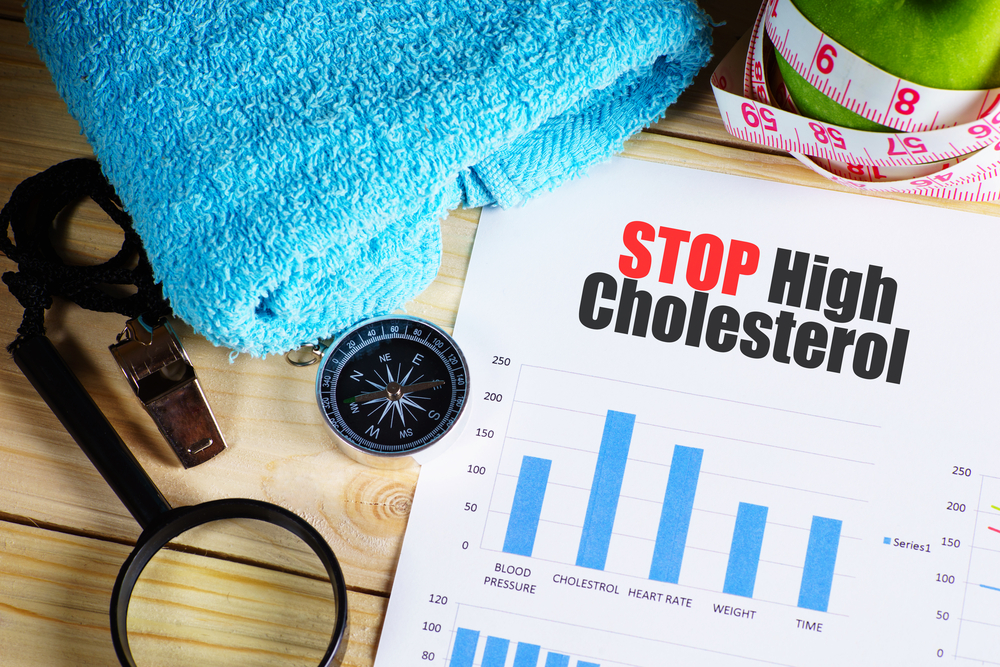If you have high cholesterol levels then your heart is in danger. Eating a healthy diet and regular exercise can prevent your cholesterol levels from increasing. Take cholesterol control measures before it’s too late.
Cholesterol is an organic compound which belongs to the group of sterols. It is a soft, waxy substance present in the bloodstream and in many cells of the body. The body synthesizes its own cholesterol. 70% of this cholesterol is made within the liver and other cells of the body and is known as the blood cholesterol. The remaining 30% of the cholesterol is obtained from the food that you eat.
Cholesterol aids in making hormones, building cell membranes, and synthesizing Vitamin D, along with many other functions. It is rewarding to the body when present in acceptable quantities but when cholesterol levels are high in the bloodstream, it can cause health problems. Therefore, cholesterol control has becomes essential.
Risks with increased cholesterol levels
High cholesterol levels in the bloodstream can lead to serious health complications, heart attack being one of them. High cholesterol levels promote the build up of cholesterol along the inner walls of the arteries. This causes narrowing of the arteries and as a result, the heart has to work harder and faster to force blood through these arteries. This can lead to heart attack or stroke.
Men are stated to be at a higher risk of heart related problems than women. High cholesterol levels can be a cause of major concern for men as increase in cholesterol levels leaves men more prone to the risk of heart attack. They may suffer from heart attack early in life. Thus, cholesterol control can have a huge impact in their lives.
Also Read:Living with Blood Thinners and their side-effects
Checking cholesterol levels
Limits are set for cholesterol in the body and by considering these limits; risk for heart attack is detected. For checking a person’s cholesterol levels, the person is required to go through a 9 to 12 hour fast without liquid, food or medication. Blood samples for performing the diagnosis are taken by the doctor. Data for the total cholesterol levels, low density lipoprotein levels and high density lipoprotein levels is determined.
The total cholesterol level is the amount of cholesterol present in the bloodstream. The normal total cholesterol level is below 200 mg/dl. The total cholesterol is divided into low density lipoprotein or LDL and high density lipoprotein or HDL. Low density lipoprotein is the type of cholesterol which deposits on the walls of arteries and forms plague. Therefore, it’s also known as bad cholesterol. High density lipoprotein helps in reducing the levels of LDL by sweeping it back to the liver.
Thus, cholesterol control is important and you should get your cholesterol levels checked every one to two years.
Ways to lower LDL
Eating too much fatty food increases the LDL levels. Diseases like obesity, diabetes, genetic disorders or a, dysfunctional thyroid gland can also contribute to the same. When you’re trying to lower your LDL levels, you have to work towards changing your lifestyle and diet for the good.
You should do at least 30 minutes of exercise everyday for several days in a week. Exercise improves your blood circulation and helps in increasing the HDL levels. It also helps in controlling weight, diabetes and, high blood pressure which also increase the risk for heart diseases. You can go for aerobic exercise as it makes your heart and lungs more efficient and is fun too.
Reduce the intake of saturated fats as they increase the LDL levels. Saturated fats are the type of fats that remain solid at room temperature and include, butter, lard, or the white fat contained in the red meat. To enhance the benefits, take unsaturated fats. They are the fats which are liquid at room temperature like, olive or vegetable oil.
Also Read:Healthy diet foods work well with lifestyle changes
- Follow these numbers:
Only 25 to 35% of your calorie intake should be from fats - Not more than 7% of your total daily calories should come from saturated fat and only 1% from trans fat
- Up to 300mg of cholesterol should be taken daily. One egg a day fulfils your requirement of 300 mg cholesterol.
- Don’t take more than 2,300 mg sodium in a day for maintaining your cardiovascular health.
- Eat lots of fruits, vegetables, whole grains and high fibre foods such as lean meats, fish and poultry.
Conclusion:
Cholesterol is a soft, waxy sterol produced by the body. Increased cholesterol levels increase the risk of heart attacks thus, demanding for cholesterol check. Changes in lifestyle and eating habits are necessary to control the increased levels of bad cholesterol and for a healthy living.



